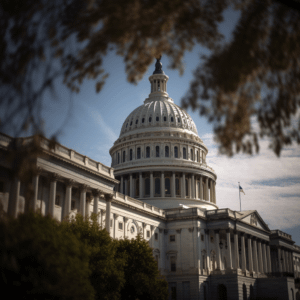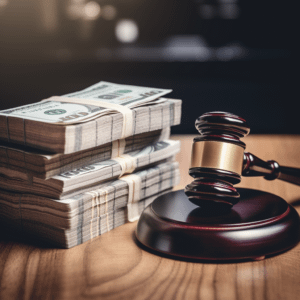Qui tam lawsuits are a way for individuals to report companies, contractors, and other individuals who have defrauded the government out of taxpayer funds. Qui tam attorneys can work alongside you to file a lawsuit that helps recover stolen tax payer funds and offers you the full protection of being a whistleblower.
Becoming a whistleblower is not a step that anyone takes lightly. However, choosing to do so can lead to substantial rewards for the person who decides to come forward. Whistleblowers who file qui tam lawsuits and report fraud can receive a percentage of the government’s total recovery. In cases of extensive or ongoing fraud, this amount can number in the thousands or even millions of dollars.
Tycko & Zavareei LLP is one of the most successful qui tam law firms currently operating in the United States. With an experienced team of specialized qui tam attorneys, we represent whistleblowers in cases that range from healthcare fraud to tax fraud, government grant misuse and contract fraud. If you suspect that you have information which could lead to you becoming a whistleblower and receiving certain rewards and protections, do not wait to speak up. Contact the law offices of Tycko & Zavareei LLP today for help with filing a qui tam lawsuit.
Qui Tam Definition

If the relator’s qui tam case is successful, they may be able to receive a percentage of the government’s total recovery as a reward for their information and bravery in coming forward. Relators are represented by qui tam attorneys, who help them remain anonymous throughout the investigation period and sometimes beyond. Most whistleblower cases are brought under the False Claims Act.
What is the False Claims Act?
The False Claims Act is a powerful qui tam law that was first passed in the 1860s. The original statute, also known as the Lincoln Law, was passed by President Lincoln in an effort to fight rampant defense contractor fraud during the American Civil War. Today, the law can still be used to hold contractors accountable. However, a series of expansions and updates has done even more to broaden the law’s applicability in the fields of health care, government grants, loans, and more. The False Claims Act also involves substantial whistleblower protections and rewards.
According to the current iteration of the False Claims Act, anyone who knowingly brings false claims to the government may be held liable for up to treble damages, as well as individual penalties assessed per claim. The rates of these financial penalties are linked to national inflation.
Many state qui tam laws are modeled after the federal False Claims Act and offer similar financial penalties and whistleblower protections for fraud perpetrated against state and local governments. However, in some states, qui tam law is mostly applied in cases of Medicare and Medicaid fraud and waste. When in doubt, consult with a qualified whistleblower lawyer to understand the extent of your state’s qui tam laws, as well as how to bring a case under the federal statute.
What is a Qui Tam Lawsuit?

Industries Commonly Involved in Qui Tam Lawsuits
Qui tam lawsuits can be filed in almost any area that involves a breach of government contract. However, they are most commonly found in the following industries:
- Healthcare industry: In recent years, fraud accounts for nearly $272 billion in waste and loss related to healthcare spending. Approximately 10 percent of the federal healthcare budget is lost to fraud annually, but qui tam cases are a way to help stop the draining of taxpayer funds. A vast majority of qui tam lawsuits take place in the healthcare industry. Medicare and Medicaid are common targets for scams, as are VA healthcare funds, pharmaceutical contracts, and more areas of government reimbursement.
- Defense industry: Defense contractors who provide substandard products, oversell their capabilities, or otherwise endanger American servicemembers can be held accountable via the False Claims Act. Government contract fraud often involves the defense industry, which relies on a broad array of defense contractors to help manufacture goods and provide services to keep American military members safe at home and overseas.
- Maritime shipping industry: Customs fraud is another field that relies on the honesty of whistleblowers to report unpaid taxes and tariffs. Imported goods may be subject to certain fees, which can lead to penalties and qui tam actions when circumvented by maritime shipping fraud.
- Technology industry: Recent developments in qui tam law create accountability for companies when they do not uphold certain cybersecurity standards. The 2021 Civil Cyber-Fraud Initiative allows whistleblower to report concealed cybersecurity breaches in government contractors’ systems. The technology industry is not the only area to be held liable via the Civil Cyber-Fraud Initiative, as the law may apply to any government contractor.
- Financial industry: The financial industry sees many qui tam claims related not only to the False Claims Act, but also to the SEC Office of the Whistleblower. Securities, commodities, and banking fraud can all be reported to a qui tam lawyer, who will be able to guide you through the appropriate reporting channels and claim a possible reward.
- Education industry: Any educational institution that receives federal funding in the forms of grants, loans, or other programming may be able to be held accountable for fraud via the False Claims Act. If you work for an educational institution and suspect false reporting is taking place for government funds such as Americorps or other initiatives, speak to a qui tam attorney today about what you know.
Who Can Be a Qui Tam Relator?
A qui tam relator may be anyone who comes forward to report fraud, at any level of employment.
You do not have to work for the company you are reporting in order to qualify as a qui tam relator and receive certain rewards and protections. You also do not have to be an American citizen in order to blow the whistle on fraud being perpetrated against the US government. The main qualifications are that you cooperate with the investigation willingly and that your information is unique, previously unreported, and substantively useful to the recovery.
Qui Tam Whistleblower Protection
Under the False Claims Act and several other statutes, discriminating or retaliating against a whistleblower is prohibited by law. Employers who retaliate against whistleblowers may open themselves up to lawsuits and other 
If you have reported fraud and find yourself being retaliated against, you may be able to sue your employer for double back pay and reinstatement, or front pay for a determined period. You may also be able to receive attorneys’ fees and other legal reimbursements.
It is critical to report your concerns to a qui tam law firm or government agency if you wish to qualify for whistleblower protection. Under certain statutes, such as the SEC Whistleblower Program, if you only report your suspicions internally, such as to a company auditor, you may not be able to qualify for reinstatement or other protections if you find yourself being retaliated against by your employer. Reporting your information to a law firm as soon as possible, however, creates a paper trail and can help protect you from possible retaliation even before an official investigation is launched.
Is There a Reward for Whistleblowing?
Whistleblowers may be able to receive up to 30 percent of the government’s total recovery in the event of a successful qui tam case. Whistleblower rewards may be mandatory for certain kinds of reporting, such as in cases of tax fraud. However, in others, the reward amount may be reduced if the whistleblower does not cooperate with the investigation or is shown to have perpetrated or planned the fraud.
Qui Tam Lawsuit Process
A qui tam attorney can help guide you through the lawsuit process, which may look different depending on the field in which you are reporting, the extent of the fraud, and more.
In general, however, the qui tam lawsuit process involves several key steps:
1. Gather evidence: Evidence of fraud often involves different kinds of documentation. Almost anything can be useful to proving fraud. Evidence may be insider information such as texts, emails, reimbursement claims, or financial reporting. It may also be as simple as company handbooks or employee training materials that illustrate appropriate practices which differ from those being carried out. In some cases of healthcare fraud, even protected materials such as medical reports or insurance reimbursement filings can be admissible evidence.
It is always best to consult with a qui tam attorney to ensure that the evidence you are collecting is useful and admissible. For instance, in some states, recording conversations without explicit permission of all of the parties involved is illegal. You do not want to harm your chances at receiving a whistleblower reward, so let our attorneys advise you on which evidence to include and leave out of a qui tam claim.
2. Submit allegations to the government: A qui tam attorney can help you liaise with the appropriate government agency for your reporting in order to establish you as the qui tam relator and as the original source for the information. Qui tam provisions state that once information has already been shared, it is ineligible for a reward. However, in some cases, government reporting may come later or not be necessary to filing your claim.
3. File a qui tam claim: You may file a qui tam claim through a whistleblower lawyer even if the government agency declines to intervene in your case. In cases involving filing or other administrative fees, your qui tam attorney’s office may be able to take on the administrative costs for you in exchange for a percentage of the whistleblower reward down the line. Your identity will be kept as private as possible during the process.
4. Government investigation: Once you have filed your qui tam lawsuit, the government has 60 days to review the claim before the company is served with the lawsuit. However, at times, the investigatory period may extend for months or even years. Ensuring that you have a qualified qui tam firm to follow up on the case can help prevent your life from getting tangled up in extensive or ongoing instances of fraud, waste, or abuse.
5. The government chooses whether or not it will pursue a case: Skilled whistleblower attorneys understand that in cases with government intervention, the rewards tend to be much higher than those without. Therefore, a qualified qui tam lawyer will know the importance of persuading the Department of Justice or other government agency to investigate your case. Choosing a whistleblower lawyer with a good reputation and extensive experience in the field can help incentivize government intervention by underscoring the seriousness of your claims.
6. Qui tam rewards are assigned: Qui tam cases can involve whistleblower payouts of anywhere from 15 to 30 percent of the total recovered funds. Because of statutes that hold fraudulent companies liable for up to three times the losses, whistleblower payouts can be substantial. Tycko & Zavareei LLP has experience with settlements totaling into the millions and even billions of dollars, leading to large rewards for the whistleblowers who launched or aided in the fraud investigation.
Hiring a Qui Tam Lawyer
Selecting the right qui tam lawyer can make or break the success of your whistleblower case. Some things to ask about when choosing your representation are:
- Credentials: Deciding between law firms can have consequences when it comes to persuading a government agency to pursue your fraud claim, especially when it is against a well-known or reputable company. The firm of Tycko & Zavareei LLP is made up of top graduates from the best law schools in the country, as well as former Department of Justice officials. Choosing a law firm that is in good standing with the government agency that needs to be convinced to hear your case can make all the difference.
- Experience: The law firm of Tycko & Zavareei LLP has been instrumental in certain high profile and “under seal” qui tam lawsuits across the country. Qui tam law can be complex and confusing for newcomers to the field, especially with different state and federal statutes at play. When selecting the appropriate qui tam firm to represent you, take note of their case history and whether or not they practice law in the appropriate areas.
- Attention: Unfortunately, some whistleblower law firms are little more than mills to churn out possible payouts. These understaffed and, at times, under-qualified practices cannot offer each client the personal attention and care that a whistleblower deserves and which a qui tam case needs to succeed. When you file a whistleblower claim, you need the best and brightest in the legal profession by your side to follow through on your case.
- Terms: The team of Tycko & Zavareei LLP is able to offer competitive terms to whistleblowers in exchange for their information. Not all law firms offer the same deal when it comes to taking on cases with a contingency fee. When in doubt, ask the law firm what to expect when the case is settled.
Qui Tam Lawsuit Examples
Successful qui tam cases can help hold wrongdoers accountable, reward whistleblowers their honesty and bravery, and reduce the likelihood of future fraud from occurring. Some qui tam lawsuit examples involve well-known banking, pharmaceutical, or defense companies who have been brought to justice for perpetrating fraud against taxpayers and their constituents.
The law firm of Tycko & Zavareei LLP has represented whistleblowers across many fields in bringing successful claims to bear. Some recent examples that are no longer “under seal” involve:
- False Claims Act qui tam case against against Eos Energy Storage, LLC (Eos Energy): The lawsuit alleged that Eos Energy committed customs fraud by misrepresenting the value of “dry batteries” imported into the United States after their production in China. The government settled the case involving underpaid import duties for $1,107,761. The whistleblower was awarded a 20 percent share.
- False Claims Act qui tam case against a health care provider who received taxpayer support and was a part of a designated Federally Qualified Health Center: The whistleblower alleged that the health care provider prescribed addictive opioids to patients who did not need them. The health care provider paid $130,000 in the case’s settlement, and the whistleblower received a 20 percent reward. Furthermore, the physician was excluded for 10 years from participation in all federal healthcare programs, including Medicare and Medicaid. This case, represented by Tycko & Zavareei LLP partners Renée Brooker and Eva Gunasekera, was particularly rewarding, as it helped prevent addictive painkillers from circulating unnecessarily, thereby saving patients and their families years of hardship and struggle.
- Kickbacks qui tam case against Advanced Biohealing, Inc (“ABH”): The lawsuit, as represented by Tycko & Zavareei LLP partners Jonathan Tycko and Andrea Gold, alleged that ABH utilized illegal kickback schemes to sell its product, Dermagraft, to hospitals operated by the U.S. Department of Veterans Affairs. That lawsuit spanned federal courts in the District of Columbia, as well as the Middle District of Florida, and resulted in criminal convictions and a civil settlement. Pharmaceutical company Shire, which had since purchased ABH, agreed to pay $350 million to federal and state governments in one of the largest settlements ever decided in a kickback case.
Qui Tam Statute of Limitations
According to a 2019 unanimous Supreme Court decision in Cochise Consultancy, Inc. v. United States ex rel. Hunt, a qui tam relator may bring a case within 10 years of the alleged fraud. The law governing the statute of limitations in False Claims Act cases, 31 U.S.C. § 3731, further clarifies that the qui tam statute of limitations elapses within:
- Six years from the time the fraud was first committed, or;
- Three years from the time the government official who was responsible for investigating the fraud knew or reasonably should have known of the fraud, or;
- Not longer than 10 years after the fraud was first committed.
Even if the statute of limitations on your case has not yet passed, whistleblower information becomes ineligible for a reward once it is reported. In some cases, publicly available knowledge can qualify for a reward when a whistleblower is able to us it to draw previously unreached conclusions. For these reasons as well as the ticking clock of the statute of limitations, it is important to come forward as soon as you suspect fraud may have been committed. The longer you wait, the more time perpetrators may have to destroy evidence, cover up their crimes, and retaliate against those who suspect wrongdoing.
Qui Tam Lawsuits: FAQs
A qualified qui tam lawyer can answer specific questions about your case with confidentiality. However, the following are some frequently asked questions that the qui tam team of Tycko & Zavareei LLP hear regularly.
 Can more than one whistleblower join together to file a qui tam lawsuit?
Can more than one whistleblower join together to file a qui tam lawsuit?
Yes, multiple whistleblowers may qualify to file a single qui tam lawsuit together. The reward may be split amongst whistleblowers, as long as the information provided is unique, previously unreported, and useful to the investigation.
Do I have to be a US citizen to file a qui tam lawsuit?
Non-citizens can qualify as qui tam relators in cases of fraud against the US government. In cases involving customs fraud or alleged bribery of foreign officials, the evidence of non-US citizens can be especially useful in ensuring recovery and reward.
Can qui tam relators remain anonymous?
Qui tam whistleblower law allows for whistleblowers to remain anonymous during the investigation of their claims. If a whistleblower’s claim goes beyond the investigation, their anonymity cannot be guaranteed. That being said, hiring the right qui tam attorney can help protect your identity as a relator as much as possible. This is because when you work with a qui tam law firm, the claim will be made through the firm and not from you directly.
If another person has filed a qui tam lawsuit alleging the same fraud, can I still bring a case?
Qui tam actions may happen concurrently in instances of extensive fraud. Additionally, if you have new information that will help an ongoing fraud case, you may be eligible to become a whistleblower on the basis of your own information and claim a reward, even if the action has already been filed.
What happens if a qui tam relator is wrong?
Working with an experienced qui tam firm can help ensure that your case involves the strongest possible evidence against the company or individual who has allegedly committed fraud. It is extremely rare for a well-researched qui tam case to be wrong. By consulting with the experts at Tycko & Zavareei LLP, you can rest assured that legal professionals have examined every element of your case before filing.
However, in the rare instance that a qui tam relator is wrong about their claims, the case will either not go to trial or be dismissed. Qui tam relators who have acted in good faith are still protected by the False Claims Act against retaliation by their employers.
What if my employer retaliates against me for filing a qui tam lawsuit?
The law protects whistleblowers against harassment and retaliation. If your employer retaliates against you for your actions as a whistleblower by firing you, suspending you, demoting you, reducing your pay or hours, or other consequences, you may be able to sue them for attorneys’ fees, legal filing fees, double back pay, front pay, reinstatement, and other damages.
How long should a whistleblowing investigation take?
Qui tam litigation can take months or even years to resolve. The qui tam process is a notably lengthy one, as it can involve many elements of discovery and investigation through several different government agencies. If the government decides to intervene, it may add firepower to your qui tam case but can also trigger several other bureaucratic processes before the case is settled. An accurate estimation of the timeline involved depends on the extent of fraud alleged in your case. However, it is not unrealistic to expect at least a year, if not several, to go by before a qui tam payout is decided upon and a whistleblower case is settled.
What actions are considered violations under the False Claims Act?
Some actions considered violations under the False Claims Act include:
- Falsifying reimbursement claims
- Undermining or failing to follow through on government contracts
- Performing substandard or non-existent work in exchange for government funds
- Certifying false claims that lead to a payout
- Misrepresenting the truth to government agencies or investigators
- Failing to report cybersecurity breaches or other damaging situations when under government contract
How are whistleblowers rewarded in qui tam lawsuits?
Whistleblowers can receive anywhere from 15 to 30 percent of the total funds recovered in the event of a successful qui tam lawsuit against a fraudulent company or individual.
What should I do if I can’t afford a qui tam attorney?
Our qui tam lawyers work on contingency fees. This means that a whistleblower does not have to front the cost of the lawsuit or hire a qui tam attorney out of pocket. Instead, our attorneys’ fees are recouped at the end of the process from the overall whistleblower payout.
Not every law office offers the same percentage or services. The law office of Tycko & Zavareei LLP offers competitive rates for high-quality professional services.
Considering a Qui Tam Lawsuit? Speak with an Experienced Whistleblower Attorney
Filing a qui tam lawsuit is an important way to recover taxpayer funds, protect vulnerable constituents, and ensure that honesty is rewarded. A successful qui tam case may deter future fraud, as well as help weed out scam artists from receiving taxpayer funds. By coming forward to report wrongdoing and abuse of government funds, 
If you have information you believe may involve fraud, wrongdoing, or abuse of government funds, speak to a qui tam law firm today. The attorneys of Tycko & Zavareei LLP are among the best qui tam lawyers practicing in the United States today. Our legal professionals are skilled in the highly specific field of qui tam law and are able to follow up on every possible area of your case to ensure that justice is done and your interests are protected.
As a whistleblower, you deserve an experienced, detail-oriented legal advocate by your side. When your professional reputation is at stake, don’t entrust your information to anyone but the best. Speak to our whistleblower qui tam lawyers today to receive a confidential, complimentary consultation about how to best proceed within the specifics of your situation.
December 2022 Update:
The United States Supreme Court heard arguments about whether the Department of Justice should be able to dismiss a qui tam lawsuit that it had previously declined to intervene in which the whistleblower proceeded with on their own. After allowing the whistleblower to proceed with their qui tam claim, the DOJ sought the dismissal of the case over the whistleblower’s objection. The DOJ expressed concern over the disclosure of “privileged documents” in its motion to dismiss. U.S. courts of appeals have thus far disagreed about whether the DOJ must intervene in a qui tam lawsuit in order to dismiss it. The Supreme Court Justices will have to make a ruling on the government’s authority to dismiss whistleblower claims and whether it should have to explain its reasoning for doing so.
June 2023 Update:
The United States Supreme Court has reached a ruling on the Department of Justice’s authority to dismiss qui tam lawsuits. In United States ex rel. Polansky v. Executive Health Resources, Inc., the Justices ruled that the DOJ must intervene in a whistleblower claim at some point before it can seek dismissal. SCOTUS clarified that the government is still a party of interest in a qui tam lawsuit even when it declines to intervene in the case and therefore retains certain rights, including the right to intervene at a later time with good cause. This means that if the government initially declines to intervene in a whistleblower case, it can do so later if it proves that it has good cause to do so. According to the case ruling, the government’s motion to dismiss the Polansky case counted as intervention in the claim and therefore satisfied this requirement.
While the government has “broad authority” to dismiss the case once it has intervened, it is required to give the parties notice and an opportunity to have a hearing before a qui tam lawsuit can be dismissed. The court that holds the hearing must consider the whistleblower’s interests and the resources they may have committed by that point in their case, but Justice Elena Kagan clarified that “the government’s views are entitled to substantial deference.” She stressed that because qui tam claims allege injury to the government, a district court should generally defer to any reasonable arguments made by the government about why the disadvantages of continuing the whistleblower case outweigh the benefits.


 Can more than one whistleblower join together to file a qui tam lawsuit?
Can more than one whistleblower join together to file a qui tam lawsuit?